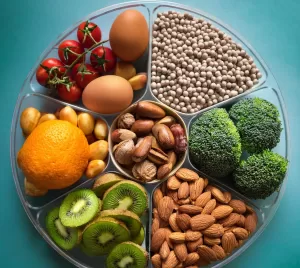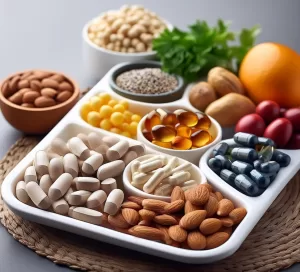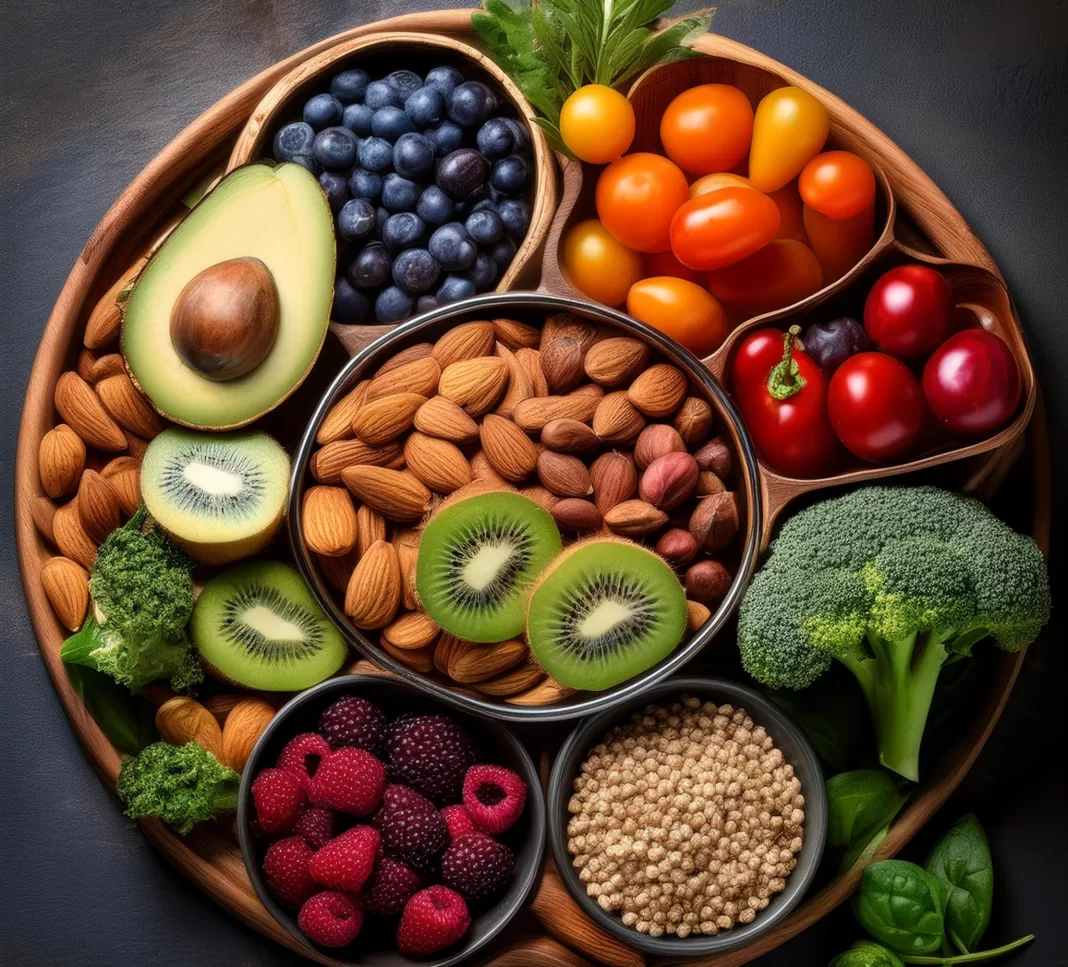Introduction to Essential Micronutrients:

- A vitamin.
- C vitamin.
- D vitamin.
- E vitamin.
- K vitamin.
- B vitamins (e.g., B1, B2, B3, B6, B12).
The Function of Vitamins in Health Care Provision Systems:
- Vitamin A helps with vision, immune function and cell growth.
- Energy metabolism is aided by Vitamin B complex as well as red blood cell formation.
- Thiamine (B1).
- Riboflavin (B2).
- Niacin (B3).
- Pantothenic acid (B5).
- Pyridoxine (B6).
- Biotin (B7).
- Folate (B9).
- Cobalamin (B12).
- Antioxidant activity is performed by Vitamin C while also improving iron absorption.
- For bone health regulation of calcium and phosphorus levels is done by Vitamin D.
- Protection against oxidative stress on cells is provided by Vitamin E.
- Blood clotting cannot take place without Vitamin K which also promotes strong bones.
Minerals, Micronutrients: The Building Blocks of a Healthy Body:
Major Minerals:
- Calcium: Essential for bone health, muscle function and nerve signaling.
- Phosphorus: Works with calcium to form bones and teeth, vital for energy storage.
- Magnesium: Involved in over 300 biochemical reactions, including muscle and nerve function.
Trace Minerals:
- Iron: Critical for oxygen transport in the blood.
- Zinc: Supports immune function and cell division.
- Copper: Assists in iron metabolism and connective tissue formation.
Antioxidants: Protecting Your Cells:
- Vitamin C: Found in citrus fruits, strawberries, bell peppers, broccoli etcetera.
- Vitamin E: Present in nuts, seeds and green leafy vegetables.
- Beta-carotene: Abundant in carrots, sweet potatoes and spinach.
- Selenium: Sourced from Brazil nuts, seafoods and whole grains.
The Importance of Trace Elements:
- Iron: Vital for oxygen transportation within the blood stream.
- Zinc: Crucial for immune function as well as wound healing process.
- Copper: Aids red blood cell formation together with iron metabolism functions.
- Manganese: Important during bone formation stages plus energy production levels too.
- Iodine: Necessary when it comes to synthesizing thyroid hormones within the body system.
- Selenium: Protects cells against oxidative damage while also supporting thyroid function among others.
Micronutrients & Immune System Support:
- Vitamin C: Protects against oxidative stress, supports cellular functions.
- Vitamin D: Modulates innate and adaptive immune responses.
- Zinc: Essential for immune cell development and communication.
- Vitamin A: Regulates immune responses and maintains skin and mucosal cells.
- Iron: Critical for immune cell proliferation and maturation.
- Selenium: Enhances antioxidant defense systems.
Brain Health Micronutrients:
- Omega-3 Fatty Acids: Essential for cognitive function and structure of neurons. They are found in fatty fish, flaxseeds, and walnuts.
- B Vitamins: B6, B12, and folate lower homocysteine levels which reduces the risk of cognitive decline. Whole grains, beans, and dairy products contain them.
- Vitamin E: It has antioxidant properties that protect brain cells from oxidative stress. Nuts, seeds, and green leafy vegetables have it.
- Magnesium: Dark chocolate, avocados, and legumes are some sources where this nutrient can be found as it promotes nerve function as well as synaptic plasticity.
- Zinc: Shellfishes like oysters, meats such as beef or pork, pumpkin seeds etc., contain zinc which supports neurotransmitter regulation among others.
Bone & Muscle Health Micronutrients:
Key Bone Health Micronutrients:
- Calcium: It is necessary for bone formation as well as strength maintenance.
- Vitamin D: This vitamin enhances calcium absorption into bones thereby promoting their growth too.
- Vitamin K: Assists in synthesis of proteins needed for healthy bones among other functions within our bodies.
Key Muscle Health Micronutrients:
- Magnesium: Muscles need magnesium to function properly including relaxing after contraction has occurred thus preventing cramps or spasms from happening frequently.
- Potassium: Regulates signals sent between nerves controlling muscle contractions hence ensuring they work together smoothly without any problems arising due to miscommunication between them caused by lack thereof potassium ions required for this purpose alone but also other roles played by these ions elsewhere throughout our bodies too such as maintaining normal heart rhythm etcetera so forth.
- Vitamin C: It helps in collagen formation which is essential for muscle repair after injury or damage has occurred to them during physical activities like exercise among others.
Effects of Micronutrient Deficiencies:
Lack of micronutrients can cause many health problems. Anemia is caused by lack of iron which makes a person feel tired and have weak immunity. When there is not enough vitamin A, people may have trouble seeing and are more likely to get sick. Not having sufficient iodine can lead to goiters or other growth problems. If you don’t get enough zinc your immune system won’t work as well and it will take longer for your wounds to heal. Without adequate amounts of vitamin D bones become weak such as in rickets or osteoporosis. Muscles and nerves need magnesium so when someone doesn’t consume it they may experience cramps or tingling sensations throughout their body.You must eat all the different types of food containing small amounts of nutrients if you want to stay healthy otherwise these diseases will occur.
How to Add Micronutrients to Your Diet:
- Eat a variety of colors.
- Choose dark leafy greens like spinach and kale.
- Include berries, citrus fruits, and cruciferous vegetables.
- Choose whole wheat, quinoa, or brown rice.
- Try oats, barley, or buckwheat.
- Include fish, lean meats, tofu, and legumes.
- Add nuts and seeds for more variety.
- Consider multivitamins if you’re not getting enough from food alone.
Natural Sources of Essential Micronutrients:
- Vitamin A: Carrots, sweet potatoes, spinach.
- Vitamin C: Citrus fruits (oranges), strawberries, bell peppers.
- Vitamin D: Sunlight (exposure), fortified milk (dairy), fatty fish (salmon).
- Iron: Red meat (beef), lentils (beans), spinach.
- Calcium: Dairy products (milk), almonds (nuts), kale.
- Zinc: Beef (meat), chickpeas (legumes), pumpkin seeds.
- Magnesium: Nuts/seeds/whole grains/green leafy vegetables.
The Role of Supplements in Providing Micronutrients:

- Pregnant women: Folic acid for neural development support.
- Elder individuals: Vitamin D + calcium for bone health maintenance.
- Vegetarians/vegans: B12/iron/omega-3 fatty acids.
Conclusion: The Main Benefits of Micronutrients to Keep in Mind:
- Stronger Immune System: Necessary for a good immune response.
- More Energy: Needed for all metabolic processes.
- Healthier Bones: Important to keep bones strong.
- Better Organ Functioning: Supports heart, liver, and brain health.
- Prevention of Diseases: Lowers the chances of getting chronic illnesses.
- Sharper Thinking Skills: Increases memory recall and cognitive abilities.
- Glowing Skin & Hair Growth: Gives you healthier skin and hair growth.

